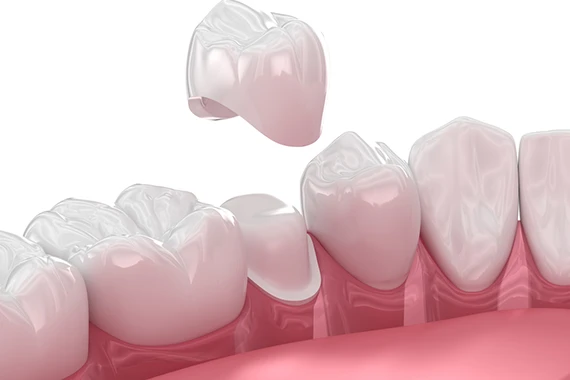How Long Does A Tooth Crown Last?
Have you ever gotten a tooth crown and wondered, “How long does a tooth crown last?” Or maybe you’re considering getting one and want to know what to expect? You’re not alone! Dental crowns are essential for many of us, helping to restore our smiles and dental health. However, how long a tooth crown lasts depends on various factors.
Let us explore the lifespan of tooth crowns, what affects their durability, and tips to make them last longer. Whether you’re already familiar with dental crowns or are just starting to learn about them, we will give you valuable insights to keep your smile shining bright.

What are the factors influencing the Lifetime of Dental Crowns?
The longevity of a dental crown is influenced by several key factors, such as:
Oral Hygiene Habits:
Regular and thorough oral hygiene practices, including regular brushing, flossing, and dental check-ups, are crucial for maintaining the health of your crown and underlying tooth structure.
Teeth Grinding and Clenching:
Bruxism (teeth grinding or clenching) causes excessive pressure on dental restorations like dental crowns, leading to premature wear and potential damage. Using a night guard recommended by your dentist can help protect your crown while you sleep.
Dietary Choices:
Certain foods and habits, such as chewing ice, hard candies, or using teeth as tools for opening packages, can increase the risk of crown damage. Avoiding such habits can preserve the integrity of your crown.
Placement in the Mouth:
The location of the crown within your mouth can impact its durability. Crowns in areas subjected to significant biting forces may experience more wear over time.
Quality of Materials:
The type and quality of materials used for your crown can influence its lifespan. Discuss with your dentist about the most suitable crown material according to your specific needs and budget.
Dental Care Provider:
Regular dental examinations and maintenance appointments with a qualified dental professional are essential for monitoring the condition of your crown and addressing any issues promptly.
Understanding the Lifespan of a Dental Crown
If you’ve been warned about teeth grinding or clenching, you might wonder about the durability of any dental work you’ve had. Your oral hygiene routines and dietary choices also influence how long dental crowns last. Keeping up with good oral care and using a night guard can significantly extend your crown’s lifespan.
Additionally, where the crown is located in your mouth matters; some crowns endure for a lifetime, while others may develop cracks and require replacement. On average, a well-maintained crown can last between 10 and 30 years. Paying attention to these factors can help you make informed decisions about your dental health.
Estimating How long does a tooth Crown last?
Dental crowns are no doubt a reliable solution for repairing damaged teeth, but they need enough tooth structure for proper attachment. Once your dentist confirms your tooth’s suitability for a crown, they ensure a snug fit to prevent food trapping and floss catching. A well-fitted crown reduces the risk of early loosening or falling out. If a crown does become loose, your dentist can re-cement it, but once it falls out, replacement is necessary. While you may prolong its life for a few years, a new crown is eventually needed to maintain tooth health.
Many dental insurance plans cover crown replacements every 5 to 8 years. However, a properly fitted crown can last well over a decade without needing replacement. Ensuring a secure fit initially significantly extends the lifespan of your dental crown, saving you time and expenses in the long term.
Common Reasons for Tooth Crown Replacement
Dental crowns are durable, but there are several common reasons why they may need replacement:
Damage:
Accidental trauma or biting down on hard objects causes chips, cracks, or fractures in the crown, compromising its integrity and necessitating replacement.
Decay:
While the crown itself does not decay, the tooth below can still be susceptible to decay if proper oral hygiene is not maintained. If decay develops near the crown margins, it may require replacement to restore tooth health.
Wear and Tear:
Over time, normal wear and tear from chewing and biting can cause crowns to wear down or become loose. This can lead to functional issues and may require replacement for optimal performance.
Poor Fit:
A crown that is not properly fitted or has open margins can allow bacteria and debris to accumulate, leading to decay or gum disease. Replacing the crown with a better fit can improve oral health.
Aesthetics:
Changes in the color or shape of the natural teeth over time can make the crown stand out. Replacing the crown can help maintain a natural and aesthetic appearance.
Gum Recession:
If gum recession occurs around a crowned tooth may expose part of the tooth structure not covered by the crown. This can lead to sensitivity or aesthetic concerns, necessitating crown replacement.
Extending the Lifespan of a Dental Crown
Taking good care and maintaining your dental crown can greatly extend its lifespan. Here are some key tips to help extend the life of your crown:
Good Oral Hygiene:
Brush your teeth at least twice a day and floss daily to avoid plaque and debris that can cause decay and gum disease. Pay special attention to the area around the crown to keep it clean and free from bacterial buildup.
Regular Dental Check-ups:
Visit a dentist for timely dental check-ups and cleanings to detect any issues early and provide necessary treatments to prevent complications.
Avoid Hard Foods:
Avoid biting down on hard objects like ice, hard candies, or pencils, as they can cause damage to the crown or underlying tooth structure.
Use Night Guards:
If you grind or clench your teeth at night (bruxism), wearing a custom-made night guard can protect your crown and prevent excessive wear and damage.
Healthy Eating Habits:
Consume a balanced diet and limit the consumption of sugary snacks and acidic foods that can contribute to tooth decay. Eat foods rich in vitamins and minerals to support overall dental health.
Quit Smoking:
Smoking can contribute to gum disease and dental problems, which can affect the longevity of dental crowns. Quitting smoking can improve oral health and extend the lifespan of your crown.
Address Dental Issues Promptly:
If you experience any discomfort or sensitivity or notice changes in your crown, consult your dentist promptly. Addressing issues early can stop small problems from turning into bigger ones.
Conclusion
So, How long does a tooth crown last? The lifespan of a tooth crown is influenced by factors such as oral hygiene habits, dental care, lifestyle choices, and the quality of materials used. By following good oral care practices and regular dental check-ups, you can ensure that your crown lasts for many years, maintaining your smile’s health and beauty.
For expert dental care and consultations on dental crowns, schedule an appointment with Prime Family Dentistry in Stone Ridge, VA. New patients can conveniently schedule online, or you can reach us at (703) 214-9126. Existing patients can also contact us at (703) 957-3536. Trust our team to keep your smile healthy and beautiful!
FAQ
How long does a tooth crown typically last?
On average, a well-maintained dental crown can last between 10 to 30 years.
Can a dental crown be replaced?
Yes, if a crown becomes damaged or worn out, it can be replaced by your dentist.
How Long Do Permanent Tooth Crowns Last?
Permanent tooth crowns are made from sturdy materials like gold, ceramic, stainless steel, or porcelain, which is much better than temporary crowns. As the name suggests, these crowns are meant to be a lasting solution, typically lasting between 5 to 15 years without needing replacement after they are installed. They offer both durability and a natural appearance, making them a reliable choice for long-term dental restoration

